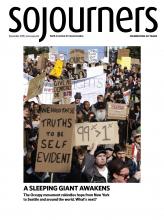TWO LIBERIAN WOMEN defy the traditional media narrative of violent conflict, which all too often focuses on men who are fighting as the center of the story. In their recent books, Leymah Gbowee (a 2011 Nobel Peace Prize recipient) and Agnes Fallah Kamara-Umunna turn this notion on its head and tell their stories of surviving 14 years of civil war. They are not victims, but central figures in bringing peace and reconciliation to their country.
In Mighty Be Our Powers, Gbowee tells the story of women learning about and fighting for their human rights and becoming architects of peace in war-torn Liberia. In 1990, Gbowee had just graduated top of her high school class and begun studies at the University of Liberia with dreams of becoming a doctor. Then the war broke out and life and her dreams became unraveled and unrecognizable.
As the horror dragged on, Gbowee became involved in peace-building and conflict resolution and transformation. Even as she balanced life as a mother of six children, she worked as a trauma counselor, visiting villages in Liberia where terrible things had taken place and helping people to tell their stories. This dialogue created awareness and helped people to find solutions and work toward conflict resolution.
She eventually brought women together from all walks of life, both Christians and Muslims, to demand an end to the war. Their slogan became, “Does the bullet know Christian from Muslim? Does the bullet choose?” These women announced their alliance with a 200-person march in Monrovia, in which they alternated singing Muslim songs and Christian hymns. They later staged a sit-in until they convinced then-Liberian leader Charles Taylor and the rebel leaders to sit down to peace talks.
Read the Full Article
